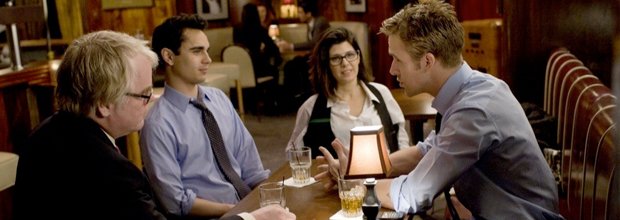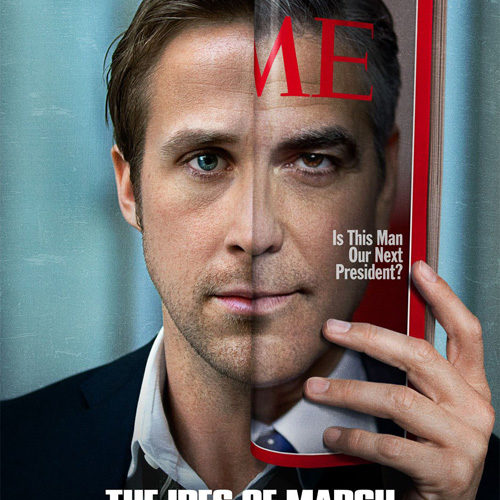
Warning: This review contains spoilers.
If one wants a low-key thriller, seek out The Ides of March. If someone’s looking for an engaging behind-the-scenes look into the world of political campaigning, seek out The Ides of March. And when it comes to dark and cynical drama about the downward spiral of a young idealist, George Clooney‘s fourth directorial feature is worth seeking out. The adaptation of the acclaimed stage play, Farragut North (by Beau Willimon, who also shares credit for the screenplay) operates well on several different layers, much to the credit of Clooney and his lean and efficient storytelling.
That downhill spiral, which plays out in a slow-burn and subtle fashion, is of Stephen Myers (played by Ryan Gosling with both a strong mixture of vulnerability and unpredictability). Stephen is a young, well-respected member of the presidential campaign team for Governor Mike Morris (Clooney). When we’re first introduced to Stephen, it’s apparent that he’s not a cheap opportunist, a chump, or any kind of man that’s easily going to compromise his morals.
Slowly but surely, that all changes. In this world of politics, it’s impossible to play nice. To succeed, you have to get your hands dirty, as Morris’ opponent’s campaign runner, Tom Duffy (Paul Giamatti), points out. Firstly, in any other film the character of Duffy would be an antagonist of some sort, but in The Ides of March, he’s the most compassionate and understanding man in the room. He’s the guy who gets his hands dirty, but doesn’t feel good about it.
Stephen ends up becoming one of those men as well, but to an extreme and unsympathetic point. Duffy isn’t the antagonist, Myers is. Throughout the story Myers is the one creating problems for himself, making mistakes, and doing the bad deeds. Ultimately, to make it to the top, that’s what he has to do. The one character who doesn’t lower himself, Paul Zara (Philip Seymour Hoffman), ends up getting left behind.
However, where do all of Myer’s acts leave him? Alone, cynical, and the man Duffy said he would become. Does the once political boy scout know how far he’s fallen? An even bigger question, does he even care by the end? Myers gets all of what he initially wanted, but despite his propelled career success, he still loses. When he kicks a journalist, Ida Horowicz (Marisa Tomei), to the side for just doing her job, and sarcastically tells her, “You’re my best friend,” there’s a cold truth to that. By the end, his best friend is a character that almost ruined his career – that’s how alone he is.
He’s on his way to becoming Mike Morris. The governor was clearly once like Stephen: full of hope before he lost his way. Morris mentions to his wife (Jennifer Ehle) how he “keeps pushing the line in the sand he said he wouldn’t ever cross,” and that’s what Stephen continues to do throughout the film. They are the same man, and Clooney perfectly frames the film to capture their isolation. The camerawork is always precise and calculative, like the characters inside them. Never showy or without a sense of style, Clooney and his cinematographer, Phedon Papamichael (Sideways, 3:10 to Yuma), perfectly capture the coldness of the subject matter.
The Ides of March is a dramatically-restrained thriller not about the world of politics necessarily, but about a man turning towards darkness. Clooney has crafted a first-rate character drama that boasts strong performances and subdued suspense. The fact that the A-list star is capable of going from a light screwball comedy – the overlooked Leatherheads – to an excellent and suspenseful drama proves he’s unquestionably one of the most eclectic and engaging filmmakers working today.


